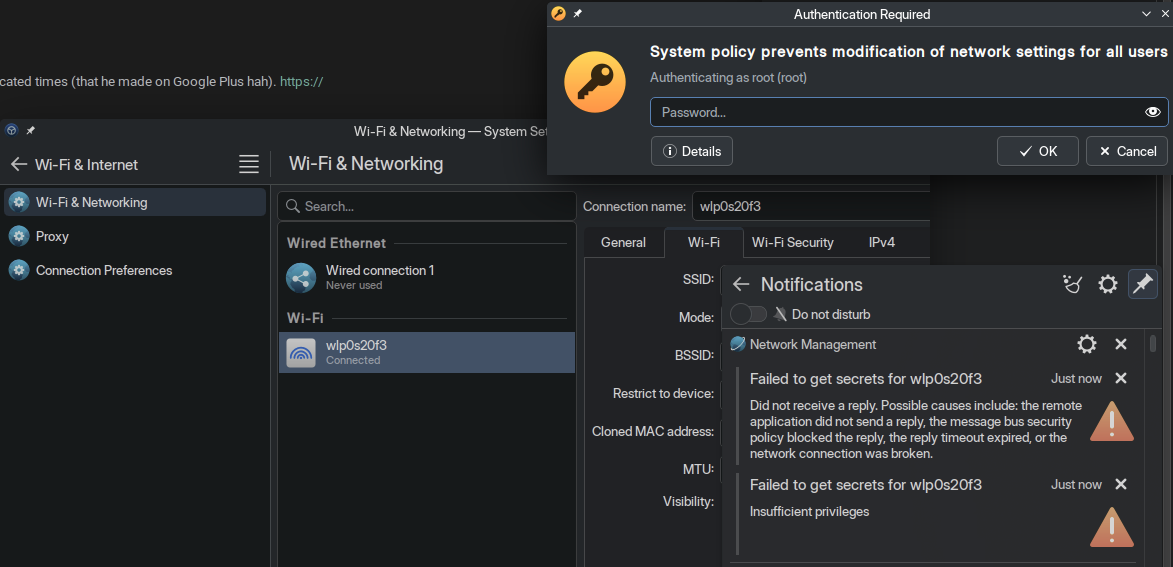Any recommendations for a linux distro that i can set up and be reasonably sure my non techy SO won’t break accidentally? The set up doesn’t have to be easy it just has to not break once I leave her alone with it. My first thought was popOS.
My plan is to have 2 profiles and not give her access to sudo. I just don’t want to have to go into it unless she needs a new program.
Fedora Silverblue.
Or really any immutable OS; they would have to go way out of their way to even edit system files, much less break the system. I just recommend Silverblue because gnome is really hard for an inexperienced user to break.
Semi-serious suggestion: Guix or NixOS. They’re not break-safe per se, but if they do break something, you can use the OS’ previous generations to go back to an operational state. Just… don’t let them use the commands that delete older generations.
(Semi-serious because they’re both not exactly mainstream and not eactly conventional in their setup.)
Yep, NixOS as a base + some Flatpak store for installing apps. In fact, use impermanence to just drop all OS state apart from logs, network settings and flatpaks. That way, “turn it off and then on again” will almost always work to fix the OS.
I’ve installed popOS to a couple of relatives, haven’t had anty issues for a year so far. Can definately recommend!
Any of the ostree variants of Fedora, be they Fedora Official or downstream ones like the Universal Blue family
Mint.
I have my mum (67) and my partner using it.
Libre office and Firefox cover 99.9% of all the things mum actually does.
My partner uses blender, krita and audacity also.
Auto updates… Almost no tech support.
Linux mint makes sense. Auto updates and its hastle free for non techy person like me.
Even if I’m doing something crazy , chatgpt to the rescue.
I prefer Manjaro, super easy.
Since less techy people tend to use more the mouse/touchpad anyways, I would pick a hard-to-mess-with desktop environment like mint or gnome. With KDE, XFCE and such you can screw panels really easily if you don’t know what you’re doing.
Slap Debian under it and there you goAny immutable distro would do I guess
That is, if you have experience running immutable distros yourself and are able to serve as a tech support for them should they ever need it.
A lot is different under the hood, and general Linux knowledge doesn’t always help.
Aurora or Bluefin would be great, general purpose distros. They’re based on Fedora Kinoite and Silverblue, respectively, so you get that atomic unbreakability with the addition of some handy software and easy, optional scripts via
ujust.I have Bazzite on a laptop specifically for this reason, so if I ever kick the bucket early, they will have a reliable and portable computer.
Bazzite does seem like a good option, thanks.
Aurora gets a vote from me. I set it up for my technically repulsive father, and he gets on just fine with it.
I guess it depends what she does on her pc.
But ignoting that, Mint without sudo. Throw in flatpaks and appimages.
Immutable distros are probably fine too but in my experience they tend to be a bit fussy if you need to change something in the system config.
Ubuntu, always a solid choice for beginners but Gnome shell is a bigger change from windows conpared to Cinamon.
P.S. I have Mint on our TV PC and my SO handdles it without issues.
Any of them. Just don’t give the root password.
This is what I do with my mom and her boyfriend. I’ve had them on Linux for a few years now and neither have managed to break anything.
Set up Tailscale and an SSH key for remote tech support
Or just wireguard and ssh?
If you already have a public facing server for them to connect to then sure.
Might end up in dumb annoying situations like setting up wifi requiring root and such
That is not a thing in userspace. No idea what you’re even alluding to here.

Surprising amount of stuff requires root (or used to). It reminds me of this glorious rant from Linus from his less domesticated times (that he made on Google Plus hah). https://forums.freebsd.org/threads/linus-to-opensuse-devs-kill-yourself-now.30414/
The highlight:
So here’s a plea: if you have anything to do with security in a distro, and think that my kids (replace “my kids” with “sales people on the road” if you think your main customers are businesses) need to have the root password to access some wireless network, or to be able to print out a paper, or to change the date-and-time settings, please just kill yourself now. The world will be a better place.
Oof.
This is old as hell, and on a locked down account. You don’t need restrictions like this for a personal use machine, and a base install of any distro wouldn’t have this type of issue whatsoever. It is not a modern concern.
Friend, this is from my own system I’m running right now lol.
Oh wild, I thought “No way!”, but apparently yes way as I (Tumbleweed/KDE/Standard User) get all of this which I imagine would be disorienting to non-Linux users. Just going to Wi-Fi & Networking, not attempting to make any changes even.

Don’t have this issue on archlinux. I think there is a group, which if you are part of, you can change networking settings.
[moonpie@cachyos-x8664 ~]$ groups moonpie sys network wheel audio kvm lp storage video users rfkill libvirt docker moonpie
Then your account is not part of the proper groups to control NetworkManager as integrated in Gnome. That’s on you.
Friend, that’s KDE lol.
Fedora Atomic desktops, specifically Kinoite with KDE6 works well for me, and is basically unbreakable due to the way it works.
Fedora is a bit too eager to deliver new updates IMO, especially KDE. As much as I love KDE, their .0 releases have had serious bugs several times in a row now. It’s always better to wait for .1 patch with Plasma. It may be hard for the user to break Kinoite, but it won’t save them from bugs.
Fedora’s mission have always been to push new stuff when it’s “mostly ready” at the cost of inconveniencing of some users, so I wouldn’t recommend it for non-tech-savvy people.
I know people say that it’s 100% stable for them (as they do for Arch, Tumbleweed, Debian Sid, etc) but that’s survirorship bias. As any bleeding edge distro, Fedora has its periods of stability that are broken by tumultuous transitions to the new and shiny tech (like it was with Pipewire, Wayland default, major DE upgrades, etc). During these times some people’s setup will break and you don’t know ahead of time if it will be yours.
eh, gnome is about the same.
i always wait for at least the .1 or .2
Haven’t used GNOME for a while, but I guess that’s a problem of open source projects in general. Though GNOME at least has Red Hat behind it.
Pick one of the
stablechannels from Universal Blue. You get the Fedora atomic goodness, but “ready” rather than “mostly ready”.Does it use the same flawed approach as Manjaro by indiscriminately delaying all updates (including critical security fixes)?
It would be whatever Fedora is doing in stable, but that seems unlikely. I’m sure the internet has the answer.
I’ve been on the
latestbranch for a year and it’s been rock solid across 2 different laptops.
I vote the same, but I’d suggest a uBlue spin of the Fedora Atomic desktops. They have better defaults (all batteries included, as they say) and are easier to use overall IMHO. Bluefin and Bazzite are both great options, and both offer KDE and Gnome variants.
Gotta be slightly careful with those spins though because there is near-zero documentation.
They have significant documentation, and anything not covered here is just part of Fedora atomic:
That is a different spin than the original comment, which is why I made that commen.
https://docs.getaurora.dev/ https://docs.projectbluefin.io/ aurora has one small page of documentation total unless you click on the logo which suddenly opens a hidden unlabeled drawer with sparse docs. Bluefin has even less. I consider this near-zero documentation. So how would OP’s non-techy girlfriend (or someone who has only heard of aurora and bluefin from this thread) know to go to bazzite, a completely different project to most people, to debug their completely different OS? Because googling “ublue aurora flatpak won’t install” literally gives this page: https://docs.getaurora.dev/guides/software/ which is literally almost useless.
Bazzite’s documentation has gotten way better since I installed it (they had almost nothing on rpmostree commands when I did), but I don’t believe everything in the documentation for bazzite applies the same to aurora and bluefin, especially with differences in pre-installed non-layered gaming defaults vs working with flatpaks will be not even close to the same.
Also fedora knoite has little documentation https://docs.fedoraproject.org/en-US/fedora-kinoite/. It has enough to get you started and installed, but that is about it. It has one single line of code about
rpmostreefor example, not even anything about installing an RPM not in fedora’s limited repos.I didn’t say any of it was bad. Just that you have to be slightly careful with using those for non-techy users because the documentation just isn’t there yet.
Bluefin has even less. I consider this near-zero documentation.
What do you feel is missing from the documentation, can you be specific? You’re examples are too generalized to be actionable.
Aurora by Universal Blue. She will be unable to break it, and it’s so freaking easy to use and install.
While I enjoy using Aurora, there were a bunch of issues popping up over the last few months (e.g. display freezes). I guess that’s the danger of a rolling release cycle, but I’m not sure it’s 100% as foolproof as it needs to be right now.
Aurora is not a rolling release. It’s part of Universal Blue, based on Fedora Silverblue.
Okay, let’s call it a semi-rolling release. Having breaking changes every 6 months is still very often for a set-and-forget system.
An immutable distro would be a good choice. They are distros designed to be more resilient against failure. For a gamer, bazzite is a solid choice; otherwise, silverblue.
Use Bluefin or some other immutable/atomic distro.
The upside is that it’s rock solid and will likely never fail in a way that cant be easily rolled back. The downside being that it’s slightly more complex to administer than a traditional distro model (which probably isn’t a big problem if you are going to be administering your SO’s PC for the most part.)
Bluefin is basically a more general desktop, less gaming-focused version of Bazzite. Bluefin uses Gnome, but there’s also a KDE Plasma version called Aurora.









